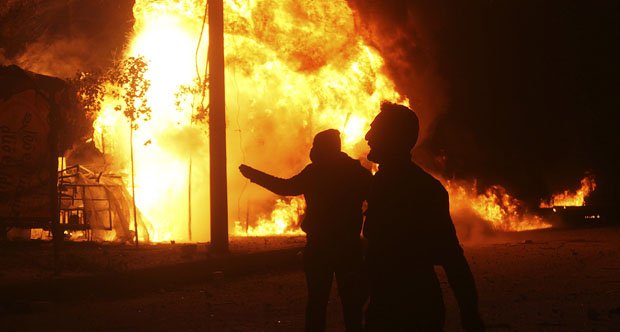 The “Geneva II” peace talks on Syria that begin this week under UN auspices have “absolutely zero” chance of achieving their formal goal – the creation of a transition to a new government – according to Atlantic Council Senior Fellow Frederic C. Hof. But, Hof told reporters in a briefing at the Council, the talks could help clarify what an alternative to Assad’s government might look like.
The “Geneva II” peace talks on Syria that begin this week under UN auspices have “absolutely zero” chance of achieving their formal goal – the creation of a transition to a new government – according to Atlantic Council Senior Fellow Frederic C. Hof. But, Hof told reporters in a briefing at the Council, the talks could help clarify what an alternative to Assad’s government might look like.
Below are key points and direct quotes from Hof’s briefing.
The Geneva II conference has no near-term prospect of achieving its supposed goal, which is to create a process leading toward a political transition away from the Assad regime’s rule in Syria.
Hof: “What are the prospects of Geneva II actually accomplishing its central mission? In my view, the near-term prospects are zero. Absolutely zero. The Assad regime has publicly rejected the very premise of Geneva II – political transition. Assad himself, a day or two ago, all but announced his reelection campaign for the presidency of Syria. Clearly, Assad’s calculation right now, based on the military situation on the ground, is that any talk of him leaving power is nonsense.”
Still, gains can be made at Geneva. a key potential accomplishment would be the public introduction of a clear alternative to Assad.
Hof: “The Syrian national coalition can introduce itself, to Syrians and the world. And perhaps more importantly it can introduce the long-waited, long-called-for alternative to the Assad regime in Syria. I would imagine that the opposition delegation will arrive in Geneva with a roster representing its idea of what the transitional governing body should look like. And this roster, I imagine would be diverse, it would be inclusive and it would probably contain names that would contain names that would include serving or former government officials, both civilians and military officers. It would be a list of names of people who have in some cases served in official capacities but have served honorably and non-criminally. This kind of approach would probably be reassuring to those Syrians who are sticking with the Assad regime, basically for no reason other than the fact that they have no idea what the potential alternative to that regime is.”
The United States needs to keep the focus on political transition in Syria, must overtly support the Syrian opposition, and must press Iran and Russia to rein in Assad’s atrocities.
Hof: “It’s important for the United States to come to Geneva with the attitude that it is there to support the Syrian opposition. That would seem on the face to be pretty obvious, but there is an alternative, and that is for the United States to arrive in Geneva with an attitude of disinterested mediation. . . . My sense is that if that is the attitude of the American delegation, the result will probably be disaster. The opposition will feel itself isolated. There’s no doubt in my mind that the Russian delegation at Geneva is going to be there primarily to support the Assad regime. The second thing the United States can do is to keep the focus on political transition at this conference. Don’t let Russia and the regime change the subject. … Finally, I think, what the United States can do is to really, really focus on the humanitarian catastrophe that is engulfing all of Syria and the entire neighborhood. And in this regard, American diplomacy on the margins of Geneva really ought to be focused on trying to oblige Iran and Russia, both, to rein in their client and get him out of the business of human rights worst-practices.”
The invitation issued Sunday to Iran, and then quickly retracted, was a miscommunication, but not a central issue.
Hof: “I have no idea what the details of all of this were, but I suspect it was most probably a case study in mis-communication involving several actors. Clearly the United Nations Secretary-General thought he had a green light to invite Iran. Clearly the United States felt outraged and double-crossed. The real question, as far as I’m concerned, is not whether Iran shows up for the opening ceremonies in Montreux tomorrow, but what if anything it does to get its client out of the these human-rights-abusive practices. Iran, in my view much, much more than Russia possesses the key leverage on the Assad regime in this matter.”
Image: Men rush to a site hit by what activists say are barrel bombs dropped by government forces on al-Katerji district in Aleppo, January 21, 2014. REUTERS/Hosam Katan
